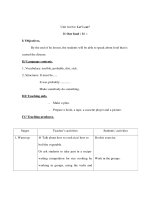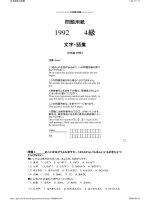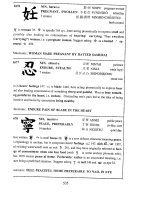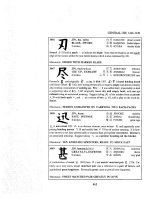101 ways to succeed in selling phần 3 ppsx
Bạn đang xem bản rút gọn của tài liệu. Xem và tải ngay bản đầy đủ của tài liệu tại đây (154.61 KB, 11 trang )
27
needs with your product or service. Your notes are also a record of any
promises you made.
73. Use the Power of the Word, “Why?”
“May I ask why you feel that way?” gets customers and prospects talking.
Prefacing “why” with “May I ask” softens the question to make it non-
threatening to the customer or prospect. This question can be used any-
time in the presentation. Another phrase you can use to get customers talk-
ing is, “That’s interesting, please tell me more.”
CLOSING AND HANDLING OBJECTIONS
74. Always Ask for the Order
Prospects expect to be asked for an order. Yet, countless studies have
shown that many sales representatives fail to ask for the order because
they fear rejection. If your presentation has been conducted properly, ask-
ing for the order is a natural conclusion. Simply asking for the order is the
most effective close.
75. Use the Magic of Storytelling
Storytelling is a powerful closing tool because it removes the prospect
from the sense that he or she is in a sales situation. You can use a story in
response to any objection, including the “big three” – no need, not now,
and price. Say simply, “Mr. and Mrs. Prospect, can I tell you a story about
(not needing the product or service, thinking it over, or price)?” The pros-
pects will almost certainly answer, “Yes,” because we all want to hear a
good story.
“My manager told me a story about a couple who didn’t purchase long-
term care insurance because they (thought the price was too high, wanted
to think it over, didn’t think either one of them would need it). Unfortu-
nately, a short time later the man was diagnosed with Parkinson’s disease.
His medical condition quickly worsened and his wife was no longer able
to care for him at home. To pay for his long-term care in a facility, she had
to go to work full-time and they had to sell most of their assets. On the
major holidays, she made special arrangements to bring him home. She
24
marked those days with a red letter “H” on the small calendar he kept on
his bedside table. The first Thanksgiving away from home, he returned for
the holiday and said the family blessing at the Thanksgiving Day table. He
closed the blessing with this addition, “My greatest prayer and wish is that
every day could be a red-letter day!” So, if they hadn’t thought (they did-
n’t need the policy, they wanted to think it over, the price was too high)
everyday could have been a red-letter day for them. Now, Mr. and Mrs.
Prospect, do you think you would like to go ahead?
76. Consider the “Actor” Close
If your organization uses a planned presentation and you find the close is
not working for you because it just does not fit “who you are” (your pros-
pects recognize the close is not you), consider the “Actor” close. Using
this close, you say the planned presentation word-for-word, but you do it
in a way that it’s obvious to the prospect that you are acting. This ap-
proach breaks the tension, allows you to pause and make comments about
the close in your own words, and helps build credibility. With the “Actor”
close you are able to combine the power and careful planning that went
into the planned presentation with your own credibility and insight.
77. Challenge Your Prospect
We all want to accept challenges because of our huge egos. Just after high
school graduation, two good friends of mine were recruited into the Ma-
rine Corps by a recruiter who essentially used this approach: “I don’t think
you guys are man enough to make it in this outfit.”
78. Use the “Therapy” Questioning Technique
The “Therapy” questioning technique is an easy, natural way to uncover
real objections in the sales process. In addition, the technique often allows
the prospect to find the solution and close the sale. Here’s how it works:
Take the last word or last few words a prospect says and repeat them in the
form of a question:
“I’m not sure this suit fits.”
“Fits?”
25
29
“Yes, it’s too tight at the waist?’
“At the waist?”
“Yes, if you can let it out a little, I’ll take it.”
The “Therapy” questioning technique is remarkable in its effectiveness
and simplicity. Try it in a conversation with family and friends to become
comfortable with it before you use it in a sales situation.
79. Handle the Price Objection with a Quotation
The price objection is one of the most common—and most difficult—
objections to handle. Noted English writer and art critic John Ruskin
(1819-1900) offered this commonsense advice on comparing prices:
“It’s unwise to pay too much, but it’s worse to pay too little. When you
pay too much, you lose a little money—that is all. When you pay too little,
you sometimes lose everything, because the thing you bought was incapa-
ble of doing the thing it was bought to do. The common law of business
balance prohibits paying a little and getting a lot—it can’t be done. If you
deal with the lowest bidder, it is well to add something for the risk you
run, and if you do that you will have enough to pay for something better.”
80. Answer Objections with New Information
Nothing irritates a prospect more than having a sales representative repeat
information when answering an objection. Repeating the same information
and asking for the order again usually destroys any chance of closing the
sale. When answering an objection always provide new information, new
facts, and new reasons for buying. Of course, the key to being able to pro-
vide new information is to find out what’s behind the objection. Keep in-
formation, facts, and reasons for buying in reserve until they are relevant
to the prospect. Pleasant persistence with newness overcomes resistance.
81. Be Professionally Persistent
Studies have shown forty-four percent of sales representatives quit after
one, “No;” another twenty-two percent give up after two, “No's;” fourteen
percent after three; and, twelve percent after four. However, sixty percent
26
of customers say, “No,” at least four times. These figures translate into just
eight percent of sales representatives getting sixty percent of the business.
82. Ask the Prospect for an “OK” rather than a “Signature”
Asking the prospect to “OK” the order softens the sale, whereas asking for
a “signature” calls for a formal decision on the part of the prospect. Ask-
ing the prospect to “sign” signals the prospect that he or she is being sold.
Asking for an “OK” is an informal, non-threatening way of asking for an
order and closing the sale.
83. Leave an Order Form When the Answer is “Not now,”
“No,” or “I need higher approval”
When you can’t close a sale because you can’t overcome a stall or objec-
tion, leave a filled in order form and a stamped, self-addressed envelope. I
was skeptical when a seasoned sales pro suggested it, but I tried it and
found it works.
84. Under-Promise and Over-Deliver
In attempting to close a sale, the natural tendency is to over-promise. We
want the order so we promise a super-quick delivery time or other induce-
ment to get the sale. Such a tactic is almost certain to backfire. When a
customer receives more than he or she expected, the result is almost cer-
tainly repeat business and referrals.
85. Provide Extra Services
If you’re selling a consumer product, offer to gift-wrap the product and
enclose a card. Offer to handle rush deliveries by arranging for UPS or
FEDEX shipping. If you’re selling business-to-business products or ser-
vices, you can also make special shipping arrangements for your customer
or have the product or service handled in some other special way. Show
the customer that you care enough to go beyond the basic requirement.
86. Reassure After Closing the Sale
Customers want reassurance that they made the right decision by going
ahead with their purchase. Simply reassure them by saying, “You made a
27
31
good decision, Mr. Smith.” Your simple statement goes a long way to pre-
venting “buyer’s remorse,” which is a natural tendency we all have after
making a purchase decision.
AFTER THE SALE
87. Use a Testimonial Book to Resell Your Customers and Get
More Referrals
Investing in a first-class, leather-bound, 3-ring testimonial book is a wise
decision. After you close a sale, ask your customer to write a paragraph
and sign your testimonial book. Your customer will probably look through
the book to get ideas on what to write, and by seeing what others have
written, he or she will be resold. At that point, asking for and receiving a
list of referral names is easy.
88. Use Your Testimonial Book to Resell Yourself
Whenever you need to “jumpstart” yourself, simply open your testimonial
book. Looking at the comments all of your customers have written will
recharge your batteries.
89. Follow-up on Leads Quickly
Hot leads cool quickly. When a prospect requests information on your
product or service, he or she most likely has an immediate need. There-
fore, the best time to follow-up on a lead is when you get it. The same is
true of referred leads. When a customer gives you a referral name, contact
the referral as soon as possible. Human nature suggests that the longer
“you sit on a lead,” the less likely you will be to follow-up on it. If you
call and leave a message and the prospect does not call you back, call
again.
90. Ask Permission to Follow-Up
The simple act of asking permission to follow-up sets the stage for a con-
tinuing relationship.
28
91. Recognize Your Customers and Prospects as Individuals
Personalize notes you write to your customers and prospects. Find out the
interests and hobbies of your customers and prospects. Then, when you
see a newspaper or magazine clipping that fits a hobby or interest of one
of your customers or prospects, you can send it along with a personal note.
Videos, audios, posters, and books are other items that will make a big
impact for a small investment.
92. Follow-up with Your Customers on the Anniversary Date
of the Sale
A note to your customers on the anniversary date of the sale is a wonderful
way to stay in touch. Even if your product or service is a “one shot” deal,
follow-ups can lead to additional business through referrals.
93. Send Thank You Notes
Immediately after a sales presentation, always send a handwritten, person-
alized thank you note. If you closed the sale, thank your customer for the
business. If the sale is still pending, thank your prospect for his or her time
and close the note by reconfirming the agreed upon follow-up plan. If the
sale was not made, thank the prospect for considering your proposal and
leave the door open for future business and referrals. When a sale goes to a
competitor, phone again after the prospect has had time to use the com-
petitor’s product or service and ask, “How is it going with XYZ?” If the
response is not positive, you have an additional chance to make the sale.
29
33
Part Three: LIFE SKILLS
94. Maintain a Balance in Your Life
Successful and happy lives are a blend of work, financial, spiritual, family,
and health values. Every life is an experiment of one and you must decide
what is of greatest and lasting importance to you. One way to do this is to
think of how you would like to be remembered. Then, carry those thoughts
over into your everyday life.
95. Write Your Life Goals and Review Them Often
One of the characteristics of successful people is that they have written
goals. Few people take this simple step. A famous study of the 1953 Yale
graduating class revealed that only three percent of the class members had
set goals, had written them down, and had a plan for accomplishing them.
Twenty years later, in 1973, a follow-up study was made. The three per-
cent who were goal setters were happier, more successful, and healthier
than their classmates. The study also revealed that the three percent had
ninety-seven percent of the net worth of the class.
96. Invest in Yourself
Your most valuable asset is your earning ability. Commit yourself to life-
long learning. Attend sales seminars. Buy books and audio and videotapes.
An investment in you is an investment in “the goose that lays the golden
eggs.”
97. Stay Physically Fit
Sales is demanding work. Make time for a fitness program. The more
physically fit you are, the more stamina and energy you will have. A regu-
lar exercise program is a wise time investment that will pay huge divi-
dends. A fit body also keeps your mind sharp. After all, if your body goes,
can your mind be far behind?
30
98. Know the Value of Today
What you do today is important because you are spending a day of your
life for it. What you accomplish today must be worth it because the price
is so high.
99. Keep a Sense of Humor
A keen sense of humor is the antidote for stress. Every situation has a
funny side. Find it and laugh about it.
100. Engage in Community Activity
Giving back to the community is a chance to acknowledge that you are a
responsible member of society. Moreover, actively giving of yourself
through volunteer opportunities is much more fulfilling than merely giving
money to charitable organizations. The wonderful thing about giving is
that you will always receive more than you give.
31
35
EPILOGUE
101. Don’t Forget to Be a Nice Person
Some people brighten rooms when they enter; others brighten rooms when
they exit. Strive to be one of the former. Just encountering a really nice
person can “make” anyone’s day. If you are a breath of fresh air, you will
make a good impression and you will be remembered in your professional
and personal life.
32
For additional copies of
101 ways to succeed in selling
:
1. Call 1-800-772-9472 toll-free
2. Fax copy of order form to 1-610-436-4836
3. Mail copy of order form with payment (check or credit card ) to:
Praxis International, Inc.
1343 Green Hill Avenue
West Chester, PA 19380-3959
101 ways to succeed in selling Order Form
Name
Company/Org
Street Address
Street Address
City, State, Zip
Tel Fax e-mail
# of copies @$ each (see prices below) $
6% sales tax (PA residents)
Total $
Enclosed is check or money order made payable to Praxis International, Inc.
Please charge my credit card Visa MasterCard
Cardholder Name Signature
Card Number Expiration Date
Prices:
1 - 4 copies $3.95 each + $.85 each shipping & handling = $4.80 each
5 - 9 copies $3.75 each + $.70 each shipping & handling = $4.45 each
10 - 24 copies $3.50 each + $.50 each shipping & handling = $4.00 each
25 - 49 copies $3.25 each + $.30 each shipping & handling = $3.55 each
50 - 99 copies $3.00 each + $.20 each shipping & handling = $3.20 each
Orders are shipped via first-class mail or UPS depending upon quantity ordered.
Please call, fax, or write for prices on larger quantities. For quantity
purchases of 500 or more copies, the front cover of this book may
be customized to feature the name and logo of your organization.
37
training, consulting and publishing
since 1988
Praxis International, Inc.
1343 Green Hill Avenue
West Chester PA 19380-3959
Tel: 610-524-0304
Fax: 610-436-4836
Order hotline: 800-772-9472









